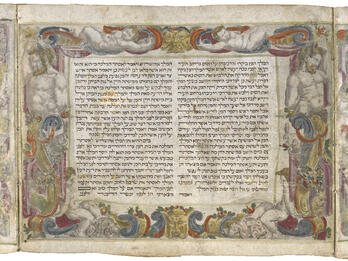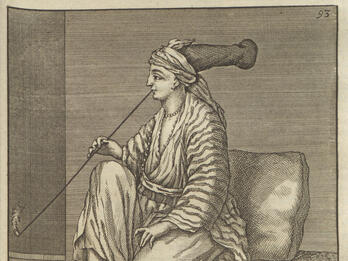Ma'ayan ganim (A Garden Spring)
The words of a pure woman “more precious than rubies”
whose wish is to attend to studies,
and her name is the gentle Dinah:
She seeks counsel from the wise
for she fears lest her honor may everywhere be slighted:
[The Woman:]
Solomon has stated in his wisdom:
“But the wise accept advice.”
And . . . the philosophers too have said in their wisdom:
“The wisest of men is in need of advice.”
And “I am the woman who stood here beside you”
And I have inferred to my own case,
how much more [than the wisest of men]
do I, a debased and foul woman,
whose natural fluidity is of the murky waters of folly . . .
need to inquire of her lord seeking counsel
to be guided and settled in the just path.
It is now many days that “I am hopping on two boughs,”
oscillating between the affirmative and the negative,
and neither is secure in my hands.
A voice calls: “Rise up!
Send for the sciences, let them come!
‘Then shall you comprehend the awe of the Lord.’
‘Be strong and show yourself a man!’”
The ignorant am ha-aretz cannot be a pious hasid.
For although women are exempted from all positive commandments determined by time,
Scripture nevertheless equates women to men regarding all sanctions under the law.
Do you not know the pearl of wisdom on the lips of the wise:
All knowledge is perfection.
Could acquiring this knowledge be any worse than sorcery, which diminishes the celestial entourage,
of which our sages nevertheless taught:
“You shall not learn to do”—but you may learn to understand and instruct?
But another voice calls:
Go! go!—we say to the female—
round and round!
do not come near the Torah!
Do you not know
the Rabbis endlessly pronounce:
“Anyone who teaches his daughter Torah,
it is as though he is teaching her folly”?
“For many are those she has struck dead.”
She who has defiantly marched toward the crest of the mountain
“is with child by harlotry”
“for they have conceived mischief,
given birth to” deceit.
She investigates that which is above
“and commits a trespass against the Lord.”
She expounds profanities regarding His Torah,
weaving spider’s webs,
“and numerous are her victims.”
Set your hand to the distaff
and your fingers to work the spindle!
Wisely spin the goats’ hair
and do not presume to enter the garden of wisdom “to pick lilies,”
the teachings of the wise.
And so my heart is disturbed lest I—God forbid—sin against the most honored,
and I would gird my loins to know “this Torah that Moses set before [the Israelites]”—
“it seems but a hopeless task”
and “my punishment is too great to bear!”
For I trespass the borders . . . of those who occupy the first place in the kingdom of theory.
And Scripture yells, roars aloud:
“A woman must not put on man’s apparel!” . . .
I have also found my iniquity in the Sages of blessed memory saying, “In what do women find merit?” concerning which it does not occur to anyone to state, “In that they study the Torah.”
And you my master, instructor of justice,
teach me “the road I must take”
and from your words I shall not diverge.
The man, understanding the woman’s wish to be filled with the plenitude of the sciences and recognizing the harm of their neglect, replies that we do not rule according to the Rabbinic saying that “Anyone who teaches his daughter Torah, it is as though he is teaching her folly.”
[The Man:]
“Most blessed of women be” the graceful doe,
a woman scholar who has acquired wisdom,
and constructed a wall of abstinence.
Come forth, beautiful woman, mistress of good sense,
listen to my voice, to that which I counsel you:
If your soul longs for the pure Torah,
for the excellence of theory,
for the seat of thought,
for the pillar of study . . .
and if your heart has despised the passions of perverse rebelliousness,
enjoyment of the world’s abominations,
the bundled vanities of time,
the splendors of the universe’s pleasures,
all of which are but vain and illusory—
then do not leave your position,
and let not materiality stop you.
And if I were not shy of my fellow [scholars] I would say:
You are but a male turned female,
you have experienced the transmutation that Dinah the daughter of Jacob underwent.
Could it be but a matter of chance that God, who declares the names in the land, has rendered you her namesake?
I apply to you this verse:
“A woman shall twist round a man.”
Now the question raised from our Sages’ saying
“Anyone who teaches his daughter Torah, it is as though he is teaching her folly” does not require much effort,
for we see the woman but not the problem!
And the following distinction can be made:
The Rabbis were only referring to a case of a father teaching a little girl,
for “a child may be dissembling in its behavior
even though [its] actions are blameless and proper.”
Certainly, then, there is room for concern,
since most women tend to folly and pass their time in vanities, and many sin for lack of temperance.
But regarding those women whose hearts moved them
to undertake the royal task, the divine craft,
moved by choice of the good because it is good,
they will “ascend the mountain of the Lord
and stand in His holy place,”
for they are exemplary women,
and the wise men of their generation
should show them deference, exalt them, and . . .
strengthen their hands, empower their arms, and gird their loins!
This will yield two goods:
From them “Torah shall come forth” [and]
the stricken men, drinking wine and eating delicacies,
for whom the afflicted body is tenfold preferable to their substantiating soul,
shirkers of the worship and religion of the community of Israel,
should reason a fortiori [from you] to themselves!
Now, concerning the Sages of blessed memory saying,
“In what do women find merit?”—
Do not fret, for we may retort:
The sages spoke of their reality,
for the majority of women in fact achieve merit only in that manner.
But it is not meant—God forbid!—to deny the [merit of] a woman concerning herself with the purity of Torah.
Perform and succeed, and heaven will assist you!
Translated by .
Menachem
Lorberbaum
Notes
Words in brackets appear in the original translation.
Credits
Samuel Archevolti, from Ma‘ayan ganim [Spring of Gardens], trans. Menachem Lorberbaum, in The Jewish Political Tradition, vol. 2, eds. Michael Walzer, Menachem Lorberbaum, and Noam J. Zohar, co-ed. Ari Ackerman (New Haven and London: Yale University Press, 2003), pp. 182–87. Used with permission of Yale University Press.
Published in: The Posen Library of Jewish Culture and Civilization, vol. 5.




